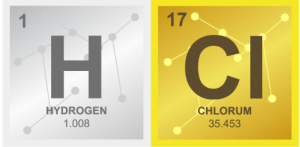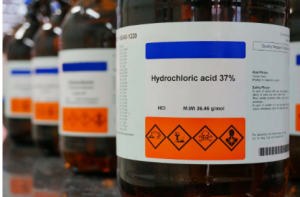Hydrochloric Acid
Metallic materials tend to corrode or revert back to a more stable oxidized state over time and more readily in aggressive environments. Choosing the most suitable material is a complex science, especially in variable temperature, compound or contaminated solutions. In particular, hydrochloric acid, often used in pickling applications in steel production, can especially be problematic for metal pumps and equipment.
Wilfley’s metal expertise and success is well established. However, we also offer extremely heavy-duty pumps designed with non-metallic wetted parts for aggressive acids and similar chemicals. In one recent example, Wilfley’s thermoset lined chemical process pumps saved a major mining customer 75% initial costs and over 1000% longer productivity cycles when compared to a comparable high alloy metallic design.
Caustic soda also known as Sodium Hydroxide is a highly corrosive chemical and will cause severe burns to human skin. It is a strong metallic base and used in a wide range of industrial and chemical processes such as paper production, waste-water treatment, and surface finishing and etching. Residual amounts of caustic soda solution will crystallize and may cause exothermic reaction with other fluids, particularly water.


Abuse Tolerant Seals
Pumping water in a controlled environment (such as a manufacturing test lab) is as easy as it gets. But pumping an acidic slurry non-stop, with variable and upset conditions with maximum uptime is another matter – but that is exactly where Wilfley shines.
A common scenario that can trigger a Lost Productivity Failure (LPF) in centrifugal pumps is loss of prime. This can occur in any industrial system, but more often in tanker/rail car off-loading applications. As a constant liquid supply is lost, the pumpage shifts to a two phase fluid (liquid and air) and flow drops to zero. Both conditions subject the rotating assembly of a centrifugal pump to abnormal loads and subsequently high vibration. The mechanical stress can be transmitted to brittle traditional seal faces with almost immediate consequences, even for double mechanical seal systems.
By contrast, Wilfley Sealing Technology separates the faces during operation, isolating detrimental mechanical vibration. Further, the allowable clearances are increased by over 270% when compared to mechanical seal requirements, allowing significantly more tolerance – all with fully isolated, full diameter shafting.
Running Dry Is No Longer A Problem
Traditional sealing technologies (or even newer magnetic drive systems) require constant thermal moderation of the primary seal or journal bearing surfaces in order to operate satisfactorily. Once the moderating liquid is lost or evacuated, the source of lubrication and ability to remove heat from these rubbing surfaces is also, and failure occurs – usually within minutes.
With Wilfley Sealing Technology, once the pump is operational the primary seal faces are separated and therefore do not require cooling via flushing. In fact, our governor-actuated static seals, such as the DryLock®, are designed to run dry (with separated faces) while the expeller manages all of the dynamic sealing requirements. By eliminating thermal stress induced by face tribology, the resultant failures of traditional sealing materials are also eliminated.
We provide customized solutions for all your industrial requirements. Talk to us.
